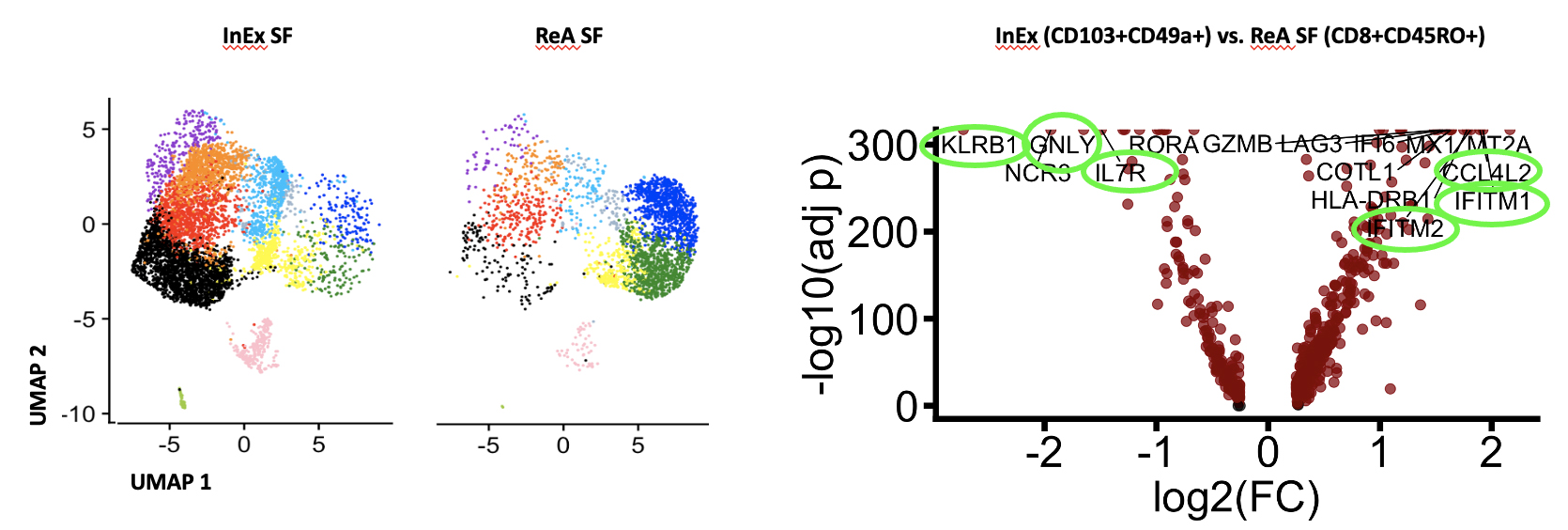Session Information
Date: Sunday, November 12, 2023
Title: (0066–0095) T Cell Biology & Targets in Autoimmune & Inflammatory Disease Poster
Session Type: Poster Session A
Session Time: 9:00AM-11:00AM
Background/Purpose: The strong clinical and genetic associations between axial spondyloarthritis (axSpA) and inflammatory bowel disease (IBD) underscore the pathogenic role of the gut-joint axis. The prevailing arthritogenic peptide hypothesis suggests that CD8+ T cells mount an immunological response upon recognition of a self or microbial arthritogenic peptide at inflammatory sites such as the gut. This could result in a clonal expansion of these cells, ultimately leading to their aberrant migration to other sites such as the joint. We previously identified a subpopulation of pathogenic mature CD8+ T cells in the axSpA synovial fluid (SF), expressing CD103+ and CD49a+ integrins (InEx cells). The expression of integrins on InEx cells implicates their role in aberrant migration between the gut-joint axis. Whether InEx cells recognize an arthritogenic peptide remains unclear. We hypothesize that InEx cells may incite and perpetuate chronic inflammation in axSpA. To this end, we characterized their T-cell receptor (TCR) repertoire and gene expression profile.
Methods: Patients fulfilling the ASAS classification for axSpA were recruited (n=4). Active joint effusion from these patients is reflective of active joint inflammation which coincided with high disease activity (BASDAI >4). We isolated peripheral blood mononuclear cells (PBMCs) and synovial fluid mononuclear cells (SFMCs), followed by FACS-sorting of mature CD8+ T cells and InEx cells. Subsequently, single-cell TCR (both α and β chains) and RNA sequencing were performed on these cell types. An HLA-B27+ reactive arthritis (ReA) sample were used as a comparison since it is the paradigm for antigen-driven inflammation initiated in the gut. Mature CD8+ T cells from ReA PBMCs and SFMCs were also FACS-sorted. These were all compared to HLA-B27+ healthy controls (n=4).
Results: The InEx TCR repertoire from axSpA patients was less diverse than mature CD8+ T cells from axSpA PBMCs or SFMCs, indicating a clonally expanded population. The TCR V/J pairings from the β chain in InEx cells confirm existing literature. Interestingly, their TRBV9/TRBJ2-3 usage was also found in mature CD8+ T cells from ReA SFMCs. Assessing the TCR V region from paired α/β chains revealed that the InEx cells shared similar usage with mature CD8+ T cells from ReA PBMCs or SFMCs: TRBV20-1/TRAV1-2, TRBV6-1/TRAV1-2, and TRBV6-2/TRAV1-2. Further, the CDR3 region of the β chain in InEx cells differed from mature CD8+ T cells from ReA SFMCs by only three amino acids. On a transcript level, InEx cells differed from ReA mature CD8+ T cells based on elevated genes such as CCL4L2, IFITM1, and IFITM2, and downregulated genes such as IL7R, GNLY, and KLRB1.
Conclusion: These observations suggest that the autoimmune mechanism employed by InEx cells could be mediated by HLA-B27+. This may enable them to incite inflammation similarly to ReA due to potential recognition of similar peptides, ultimately driving the selection of specific T cell clones. However, InEx cells’ ability to perpetuate inflammation may be distinct from ReA due to a varied transcriptome. This has important implications for therapeutic designs attempting to target integrin blockade in axSpA.
To cite this abstract in AMA style:
Qaiyum Z, Tang M, Inman R. Proteomic, Transcriptomic, and T-Cell Receptor (TCR) Profiling of Synovial Integrin-Expressing (InEx) T Cells in Axial Spondyloarthritis (axSpA) [abstract]. Arthritis Rheumatol. 2023; 75 (suppl 9). https://acrabstracts.org/abstract/proteomic-transcriptomic-and-t-cell-receptor-tcr-profiling-of-synovial-integrin-expressing-inex-t-cells-in-axial-spondyloarthritis-axspa/. Accessed .« Back to ACR Convergence 2023
ACR Meeting Abstracts - https://acrabstracts.org/abstract/proteomic-transcriptomic-and-t-cell-receptor-tcr-profiling-of-synovial-integrin-expressing-inex-t-cells-in-axial-spondyloarthritis-axspa/


